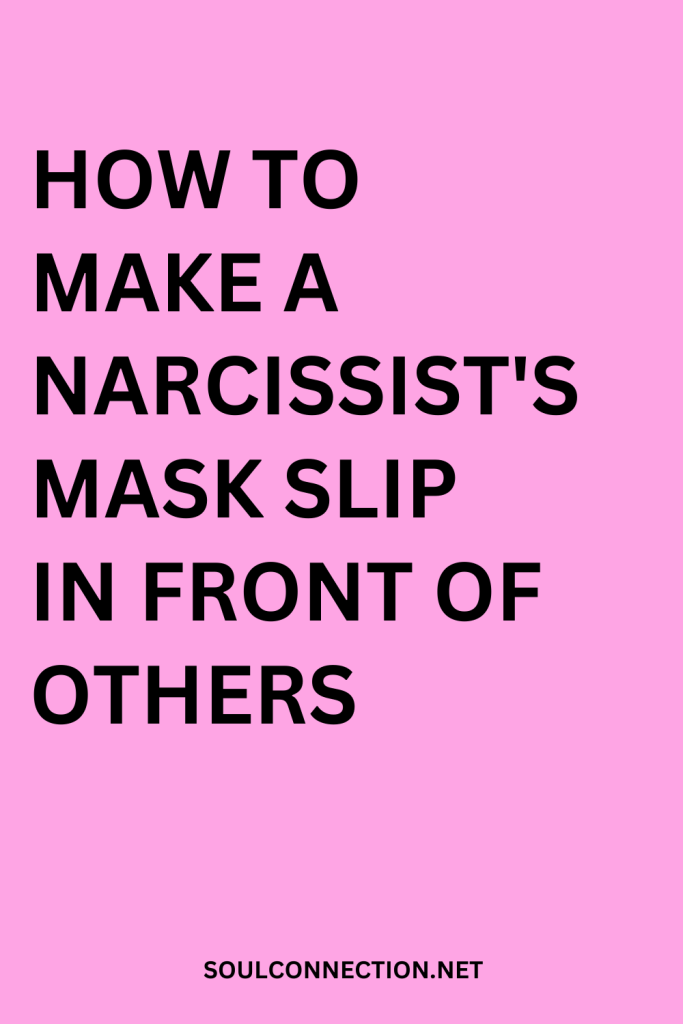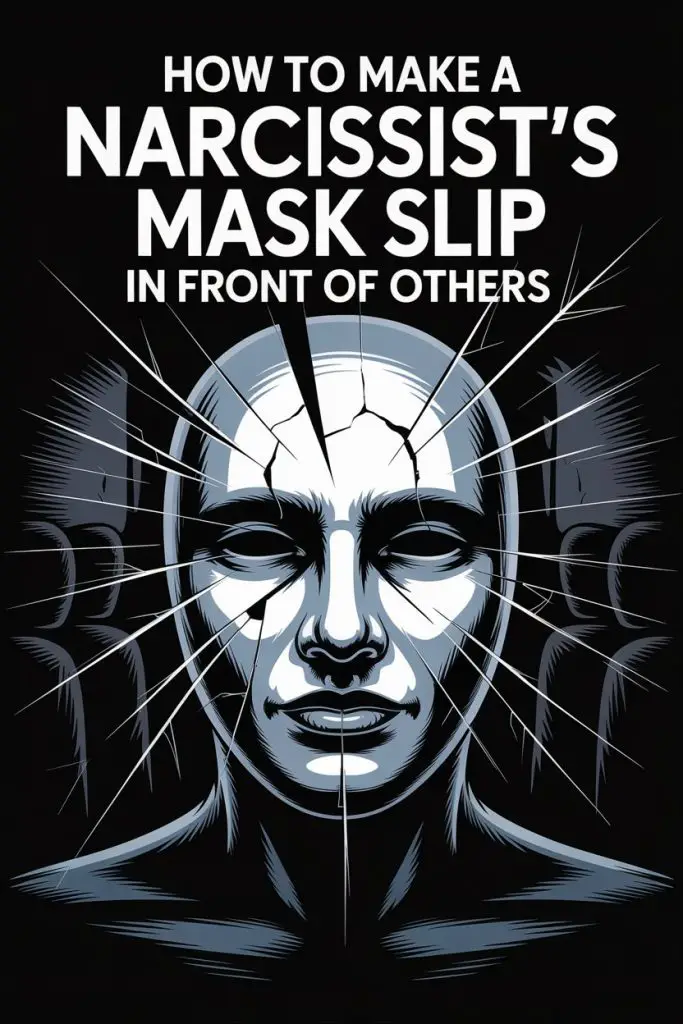Ever watched a narcissist parade around at a dinner party, basking in applause, only to wonder—how on earth does nobody else see through the act?
Narcissists are masters of disguise, donning charming facades that would make professional actors jealous.
But masks have a habit of slipping, and with a little know-how (and the patience of a saint), you can nudge that carefully crafted persona right off its perch, sometimes even in public.
Here’s how to let the daylight in on the drama.
Why Narcissists Love Their Masks
Narcissists wear their masks for the same reasons the rest of us wear pants: to avoid exposure and keep things socially acceptable.
Their mask is all about getting admiration, dodging accountability, and making sure nobody sees the gnawing insecurity underneath.
While it’s not your job to be anyone’s therapist (unless, of course, you are, in which case, good luck), sometimes the only way to stop the gaslighting circus is to show others what you’re seeing.
Timing Isn’t Everything, But It Helps
Catch a narcissist when they’re basking in the limelight and there’s a good chance you’ll be treated to the full suite of charm and wit.
On the other hand, wait until the admirers have wandered off and the snacks are gone, and the cracks might start to show.
The mask is heaviest when no one’s watching, and nothing irks a narcissist quite like being forced into the background. An audience helps, but the right moment helps more.
Subtle Provocations: Not for the Faint of Heart
Think of a narcissist’s mask as a cheap Halloween costume. Tug in just the right place and it starts to unravel.
Sarcasm or direct confrontation isn’t the ticket here.
Publicly challenging a narcissist is like poking a beehive—you’ll get a show, but you might also get stung. Instead, try gentle, disarming questions or comments that highlight hypocrisy or demand empathy.
When asked, “Didn’t you say the opposite last week?” in front of others, a narcissist might stutter or become defensive. The mask doesn’t respond well to polite inconsistency detection.
The Power of Silence
Narcissists thrive on attention, applause, gasps—basically, any emotional ping. Take that away and you’ll often see a twitch.
Simply withholding expected praise or agreement in a public setting can send their ego into a tailspin.
Remain calm, let them flounder, watch as they fill the silence with increasingly desperate attempts to regain center stage. (Warning: Awkwardness levels may spike. That’s your cue it’s working.)
The Empathy Test
Nothing peels back a narcissist’s mask quite like a call for genuine empathy. In a group, steer conversation toward someone’s hardship or success—something that requires a human response.
Most people react with warmth; narcissists default to self-reference, minimizing, or one-upping.
“Oh, you got promoted? Well, I once got three promotions in a month.” Subtle, right? Others might not catch it immediately, but repeated exposure has a way of waking people up.
Fact-Checking in Real Time
Narcissists love rewriting history on the fly. If you can, gently correct a blatant falsehood in front of others—without attack, just with, “Actually, I remember it differently.”
The key here? Zero drama. No raised voices, no rolling eyes. Watch how quickly the narrative becomes tangled. Witness the mask’s nervous shuffle.
Group Dynamics: The Safety in Numbers Effect
Narcissists are most convincing one-on-one or when surrounded by admirers. When faced with a group that doesn’t automatically feed their ego, the mask starts to itch.
Encourage more group discussions, invite quieter folks to chime in, and resist getting sucked into one-on-one “performances.”
In a well-balanced group, the narcissist’s tactics—interrupting, boasting, dramatic victimhood—stand out like sequins at a funeral.
The All-Too-Obvious Brag
Narcissists inflate their achievements with the subtlety of a marching band. Publicly, these stories can sound impressive—until they’re repeated, embellished, and contradicted three times in the same evening.
Cue a gentle, “Didn’t you say last time it was a different company?” or “I thought you hated skydiving?” Everyone loves a fact-checker—except the narcissist.
Emotional Overreaction: The Big Give-Away
Expect fireworks when a narcissist is challenged, ignored, or upstaged. While most people can brush off small slights, narcissists react as if someone’s just insulted their gran.
Sudden outbursts, sulking, or dramatic exits betray the vulnerable ego beneath. The more public and minor the trigger, the louder the mask’s thud as it hits the floor.
Triangulation Trap
Watch for the “divide and conquer” strategy: pulling others aside, whispering, subtly pitting people against each other. Someone who’s constantly creating drama or turning friends into rivals isn’t just unlucky—they’re working the room.
Encourage openness and transparent communication in any group setting. The more public the conversation, the fewer shadows for manipulation to hide in. Narcissists hate a level playing field.
What Happens When the Mask Slips
The moment a narcissist loses their grip in front of others can be electrifying—and frankly, a little tragic. Anger, tears, victimhood, or a desperate scramble for sympathy may follow.
Don’t expect a Hollywood-style unmasking. More likely: awkwardness, defensiveness, and maybe a hasty exit. But pay attention, and you’ll notice people’s eyes widen. Slowly, the spell breaks.
What to Do After the Mask Drops
Resist the urge to gloat. You’ll win no friends by standing over a fallen ego waving a victory flag. Instead, stay cool, keep your dignity, and trust others to draw their own conclusions.
Sometimes, people need to see the drama firsthand to believe it. When they do, a quiet nudge—“That was a bit much, wasn’t it?”—can help validate their uneasy feelings without pushing too hard.
Handling the Fallout (or Fireworks)
A narcissist exposed is a wounded animal. Expect denial, rage, or crocodile tears. Prepare for a smear campaign, especially if they sense their audience turning.
Protect yourself by sticking to facts and refusing to engage in drama. Document important interactions if things get truly messy.
Above all, don’t wander into the arena for round two. It’s not your job to referee the meltdown.
Should You Even Pull the Mask?
A little honesty check: exposing a narcissist can be satisfying, but it’s rarely consequence-free. If you’re in a position of power imbalance—at work, in family, in romance—think carefully.
Sometimes, letting the mask slip isn’t about drama or retribution. It’s about reclaiming your own reality and protecting others from getting caught in the web. Pick your battles, weigh your safety, and prioritize your peace.
No One Wins an Argument with a Narcissist
Tempting as it is to “prove” what’s behind the mask, narcissists will always have an answer, a deflection, or a performance ready. The point isn’t to win an argument—it’s to let reality speak for itself.
Let others see the cracks, trust that truth has a way of leaking out, and stop expecting a confession or apology. You’ll be waiting a long time.
When the Show’s Over
Pulling back a narcissist’s mask isn’t about revenge or spectacle (though, let’s be honest, sometimes it’s a teensy bit satisfying). At its best, it’s a way to reclaim your perspective and help others see what’s been hidden in plain sight.
If you’re dealing with a narcissist front-stage and center, remember: their performance is about them, not you. Don’t take on the job of exposing them unless you’re ready for the curtain call and everything that comes after.
And if you catch yourself wishing you’d just stayed home, ordered takeaway, and watched reality TV instead—well, you’re not alone.
At least on TV, the masks come off before the credits roll.


